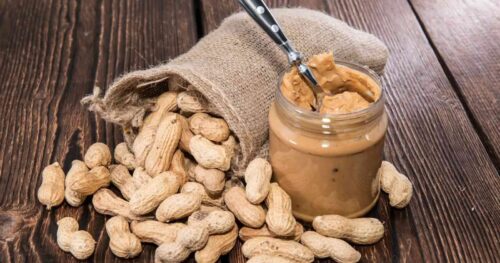Have you ever wondered about the creamy goodness of peanut butter and how it fits into your daily nutrition? Well, my curious friends, you’re in for a treat as we delve into the world of peanut butter and explore the protein-packed goodness that lies within each spoonful.
The Importance of Protein
Protein is like the building blocks for our bodies, helping with growth, repair, and overall well-being. Now, when it comes to protein-packed delights, peanut butter is a fan favorite. So, let’s embark on this journey together and uncover the nutritional breakdown of our beloved peanut butter.
Understanding Peanut Butter
Definition
Before we dive into the nitty-gritty, let’s start with the basics. Peanut butter is a delightful spread made from roasted peanuts. The peanuts are ground into a smooth or chunky paste, creating the creamy or crunchy options we all know and love.
Types of Peanut Butter
Not all peanut butters are created equal. You’ve got your natural, your creamy, and your crunchy variations. Each type has its unique nutritional profile, so it’s worth exploring which one suits your taste and dietary preferences.
Nutritional Composition of Peanut Butter
Protein Content
Ah, the star of our show – protein. Peanut butter is not only a delicious treat but also a protein powerhouse. On average, you can find around 3-4 grams of protein in a tablespoon of peanut butter. This makes it an excellent choice for those looking to sneak in some extra protein without sacrificing taste.
Fat Content
Now, don’t be scared off by the word ‘fat.’ Peanut butter is rich in heart-healthy monounsaturated and polyunsaturated fats. These healthy fats play a crucial role in maintaining our body’s functions and can even help lower bad cholesterol levels.
Carbohydrate Content
While protein and fats take the spotlight, peanut butter also contains carbohydrates. These carbs provide a quick energy boost, making peanut butter a fantastic snack for that mid-afternoon pick-me-up.
Micronutrients
Peanut butter isn’t just about the macronutrients; it’s also packed with micronutrients like vitamin E, magnesium, and potassium. These little powerhouses contribute to overall health and well-being.
Protein in One Spoon of Peanut Butter
Serving Size
Let’s talk about what exactly constitutes ‘one spoon’ of peanut butter. For the purpose of our exploration, we’ll stick to the classic tablespoon measurement.
Protein Content
In one tablespoon of peanut butter, you’re looking at around 3-4 grams of protein. Now, that might not sound like a lot, but considering the average daily protein requirements, it’s a pretty decent contribution.
Comparison
To put things into perspective, one tablespoon of peanut butter contains roughly the same amount of protein as half an egg or a small slice of chicken breast. It’s a convenient and tasty way to boost your protein intake.
Benefits of Peanut Butter as a Protein Source
Satiety
Ever had a spoonful of peanut butter and felt satisfied for hours? That’s the magic of protein and healthy fats working together. Peanut butter can help curb those hunger pangs, making it a fantastic addition to your snacks.
Convenience
Picture this: you’re in a hurry, and you need a quick protein fix. Enter peanut butter! Whether spread on toast, stirred into oatmeal, or simply enjoyed by the spoonful, it’s a portable and versatile option for busy days.
Nutritional Value
Peanut butter isn’t just a one-trick pony. Besides protein, it brings fiber, healthy fats, and various vitamins and minerals to the table. It’s like a nutrient-packed superhero in a jar!
Considerations and Tips
Allergies
Now, my friends, let’s talk about allergies. If peanuts aren’t your pal due to allergies, fear not! There are alternative nut butters like almond, cashew, or sunflower seed butter that can still provide that nutty goodness without the risk.
Portion Control
As with any good thing in life, moderation is key. While peanut butter is a nutritional powerhouse, it’s also calorie-dense. Be mindful of your portions to avoid going overboard on those delicious calories.
Quality
Not all peanut butters are created equal, so choose wisely. Opt for natural varieties without added sugars or unhealthy additives. Your body will thank you for it!
Conclusion
In conclusion, peanut butter is not just a tasty treat but a nutrient-packed addition to your diet. With around 3-4 grams of protein per tablespoon, it’s a convenient and delicious way to meet your protein needs.
So, the next time you reach for that jar of peanut butter, know that you’re not just indulging in a flavorful snack. You’re nourishing your body with essential proteins, healthy fats, and a host of micronutrients.
ALSO-READ: Pomegranate Nutrition: Unveiling the Health Benefits
